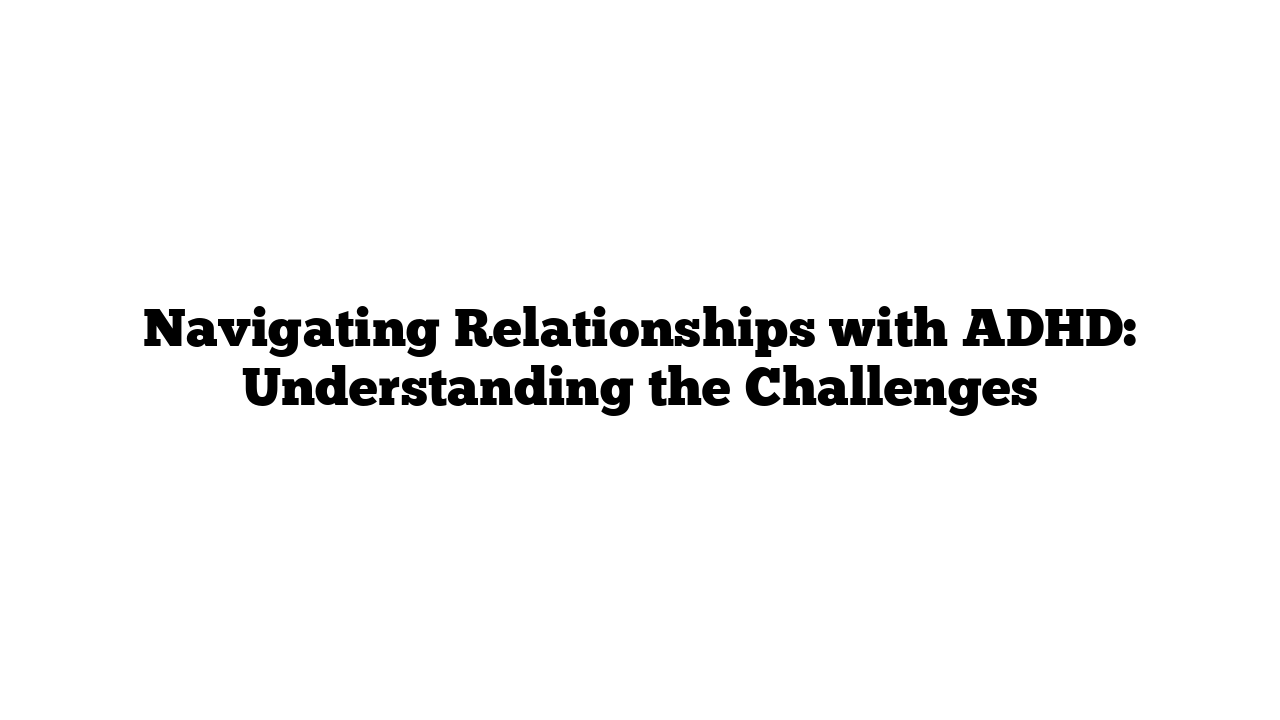Building Stronger Connections: Managing ADHD in Relationships
Disclaimer: This article is for educational purposes only. If you are experiencing symptoms of ADHD, it’s best to consult a healthcare professional for a proper diagnosis.
ADHD can significantly impact our relationships, leading to frustrations and misunderstandings, whether in romantic partnerships, family dynamics, or friendships. Understanding how ADHD affects these connections is vital for fostering healthier and happier relationships.
The Impact of ADHD on Relationships
If you or your partner has ADHD, it’s crucial to recognize how this might influence your relationship. The most common symptoms of ADHD in adults include:
- Difficulty concentrating
- Forgetfulness
- Excessive talking
- Easily becoming stressed
- Disorganization
Since relationships require attentiveness and effort, difficulties in concentration can lead a partner to feel unheard or overlooked. This, coupled with a tendency to zone out during important discussions, can create additional challenges.
Forgetfulness can hinder the planning of enjoyable activities, an essential aspect of nurturing a loving relationship. Impulsiveness and emotional regulation challenges can also complicate interactions.
Understanding ADHD Symptoms
To maintain a healthy relationship, it’s important for both partners to understand ADHD symptoms thoroughly. This knowledge allows each person to empathize with the other, fostering patience and compassion.
The Importance of Communication
Communication is crucial in any relationship, particularly when ADHD is involved. If you have ADHD, make an effort to educate your partner about the symptoms and challenges you face. Conversely, if your partner has ADHD, take the initiative to learn more about their condition.
Open and honest conversations can pave the way for greater understanding and help prevent misunderstandings.
Strategies for Managing ADHD Symptoms in Relationships
Here are some effective strategies to help manage ADHD symptoms within your relationship:
1. Addressing Distraction
If distraction is an issue, your partner may feel neglected. Encourage open dialogue about these feelings and reassure them that your distractions are not a reflection of your love or commitment.
Keep track of your attention span; if you find yourself zoning out, communicate this to your partner. You can ask them to repeat what they were saying to ensure you’re engaged.
2. Combatting Forgetfulness
Forgetfulness can strain relationships, especially if it affects plans or commitments. Set reminders for important activities and use tools like phone alarms, calendars, or sticky notes to keep track of events.
This proactive approach shows your partner that you value your time together and are committed to maintaining your relationship.
3. Managing Impulsivity
If impulsivity is your biggest challenge, whether related to spending, speech, or risk-taking, there are steps you can take to improve self-control. Discuss these issues with your partner and consider seeking professional guidance if needed.
Establish a budget and learn strategies to pause and think before acting or speaking. This self-awareness can help mitigate impulsive behavior and strengthen your relationship.
Conclusion
At the heart of managing ADHD in relationships is communication. Always be kind to yourselves and remember that you are a team navigating these challenges together. By working together and fostering understanding, it’s possible to create a loving and supportive relationship despite the hurdles ADHD may present.
If you found this information relatable and helpful, consider visiting theminiadhdcoach.com for more tips on navigating ADHD!
